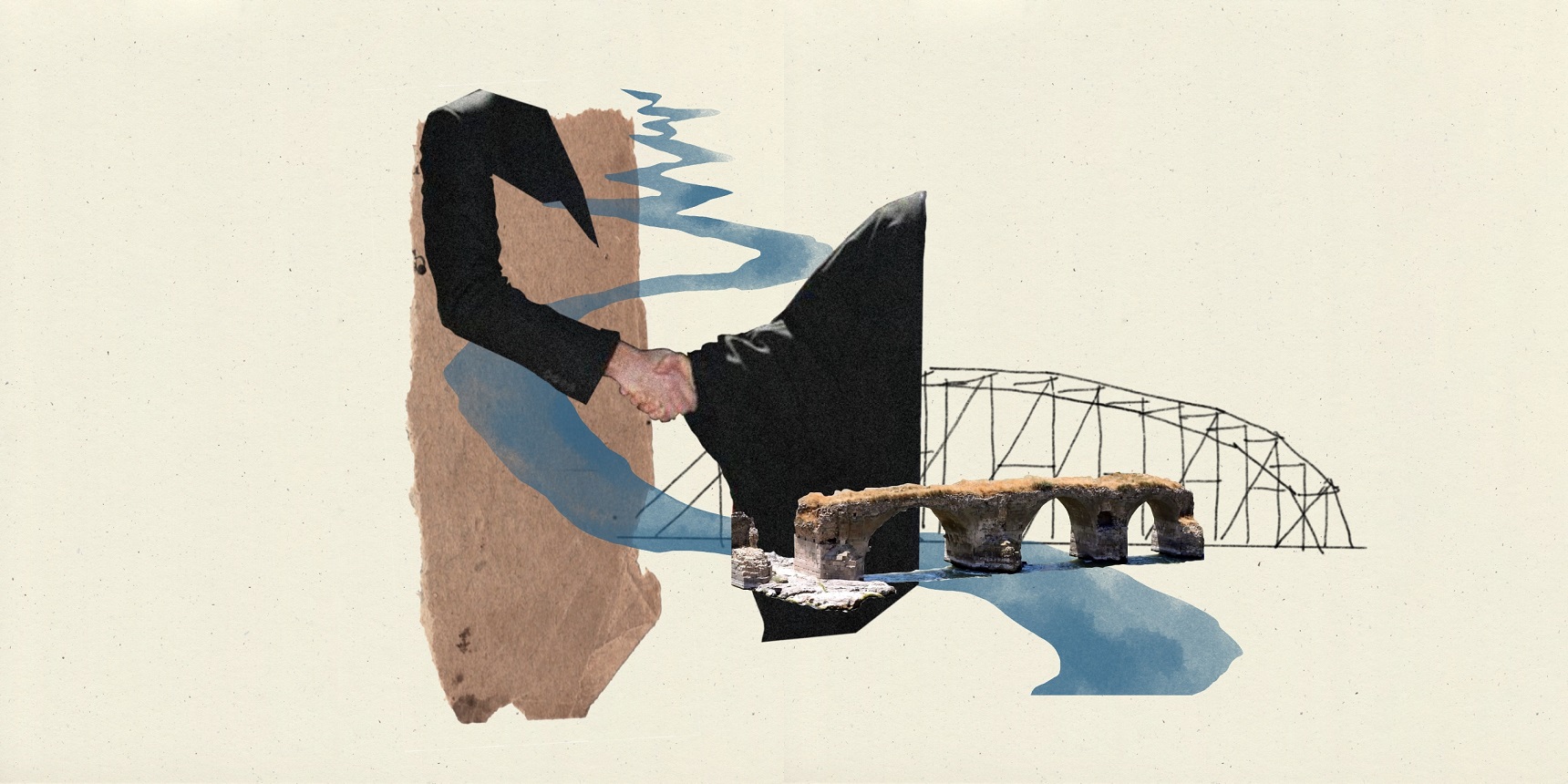
After a period of over three years of high tensions between the Islamic Republic of Iran and Azerbaijan, the visit of Iranian Foreign Minister Hossein Amir Abdollahian to Baku in July 2023 seems to have eased strained relations. This was followed by the two sides announcing the construction of a road via Iran, connecting Zangelan to Nakhichevan. On October 6, the foundations of a bridge over the Araks River were laid in the presence of Azerbaijani Deputy Prime Minister Shahin Mustafayev and Iran’s Minister of Roads and Urban Development Mehrad Bazrpash. The Azerbaijani side will also finance the construction of a railway and a motorway.
Yet, it is difficult to imagine that the current calm in Iran-Azerbaijan relations will be maintained. Dr. Vali Kaleji, a lecturer at the Faculty of Law and Political Science at Tehran University and author of two books in Persian on Armenian history, is an observer of the Caucasus. He believes that while “political tensions recently subsided between Iran and Azerbaijan, the causes of those tensions have not been completely resolved.”
Iranian policymakers believe that their national interests are under threat in the northwestern frontier. The Second Karabakh War seems to have triggered a profound shift in their thinking regarding the security of their borders. This anxiety cannot be alleviated through economic, commercial or infrastructure cooperation alone. But why this sudden shift in Iranian thinking?
The change came after the 2020 war, when Tehran was just as surprised by the war’s impact as the Armenian leadership. “Iranians were surprised by the rapidity of the war, and by how weak Armenia was,” said Eldar Mamedov, a political analyst based in Brussels who closely monitors Iran-Azerbaijan relations.
According to Dr. Ehsan Movahedian, a lecturer in international relations at Allameh Tabataba’i University in Tehran, “In 2020, Iran did not understand the seriousness of the situation and how it posed a direct threat to Iranian national interests. This was because of the weakness of analysis in Iranian elite circles, and the influence of the pro-Aliyev lobby in Iran.” Additionally, during this period, the Iranian leadership was “focused on JCPOA [Joint Comprehensive Plan of Action] or the nuclear deal” and paid little attention to the developments in the Caucasus.
Iranian Reactions
In early October 2021, an unusual event occurred on the border between Azerbaijan and Iran. In front of the Islamic Republic’s television cameras, thousands of Iranian soldiers, tanks, and missile launchers were sent to the north of the country to conduct emergency wargames. The Iranian authorities escalated their threats against their neighbor, Azerbaijan. This marked the first time such military exercises have taken place in this region since the collapse of the Soviet Union.
These exercises followed the arrest of two Iranian truck drivers by Azerbaijani soldiers on the highway linking Iran to the Armenian capital Yerevan. This strategic route, which includes a section of approximately 20 kilometers that came under Azerbaijani control after the Second Nagorno-Karabakh War, poses a threat to the transportation routes between Iran and Armenia.
The Iranian show of force was also a message of firmness to Israel. By entitling its military exercise “Conquerors of Khaybar” — in reference to a battle in 628 AD, between the first Muslim armies and a Jewish tribe from the Arabian Peninsula — the Islamic Republic is clearly opposing the growing military influence of Israel in the region. Israeli equipment played a decisive role in Baku’s victory over Armenia, and President Ilham Aliyev of Azerbaijan, did not hesitate to pose with an Israeli-made Harop attack drone at a military base in Jabrayil, on the border with Iran. Additionally, Iranian authorities suspect that Azerbaijan provided logistical assistance for many Israeli operations, including the assassination of Iranian nuclear scientist Mohsen Fakhirzade in Tehran in 2020. However, military cooperation between Israel and Azerbaijan is not a recent development, and there have been rumors since 2009 about Israel using Azerbaijani military bases for operations inside Iran. Why did the 2020 Nagorno-Karabakh war provoke such anger among Iranian leaders?
It was not only Azerbaijani military successes or the weakness of Armenia that brought this shift in Iranian threat perceptions. The way Azerbaijan won the war, by inviting Turkish military participation and using Syrian mercenaries, also played a role. Both Baku and Ankara have revived a pan-Turkic or pan-Azerbaijani discourse about “Southern Azerbaijan”, which poses a threat to the territorial integrity of Iran. Moreover, Tehran is concerned about the increasing Israeli presence along its northern borders. There are rumors of the Israeli military directly operating from the recently renovated Zangelan airport.
Mostly, Iran was surprised to witness Russian’s passivity in allowing other external actors to intervene militarily in the South Caucasus, a region that was expected to be within Moscow’s exclusive “Near Abroad”. Iran had relied on Russia to keep the status quo in the South Caucasus, but was disappointed to realize that it could not outsource its own national security to Moscow.
“The Turkish-Azeri tandem is a long-term challenge for Iran,” according to Eldar Mamedov.
Bilateral relations between Iran and Azerbaijan deteriorated further in 2022 and early 2023. In October 2022, four weeks after Azerbaijani incursions deep inside Armenia, the Iranian Armed Forces conducted a second large-scale military exercise codenamed “Mighty Iran”. During this exercise, they practiced crossing the Araks River. Then, in January 2023, an Azerbaijani diplomat was assassinated inside the Azerbaijani embassy in Tehran by a gunman armed with a Kalashnikov rifle. This incident brought bilateral relations to a new low.
A final element was the activation of “Husseiniyun”, an Azeri-Shiite militant group that was established in 2017 by none other than former Islamic Revolutionary Guard chief Qasem Soleimani. This organization is similar to the Lebanese Hezbollah, or the Fatimiyun, which is composed of Shiites from Afghanistan and Pakistan and deployed in Syria. They are supported and guided by the Iranian Revolutionary Guards.
Azerbaijan responded by conducting massive arrests within its own Shiite population suspected of having close ties to the Islamic Republic. This included independent Shiite religious figures. In October 2021, Azerbaijan closed down the Husseiniyya Mosque and the office of Sayyid Ali Akbar Ojaghejad, the representative of Supreme Leader Ayatollah Ali Khamenei in Baku. Azerbaijan also keeps its land borders closed, citing COVID-19 measures, but in reality, it is to insulate the country from Iranian influence.
What to Do With Armenia?
Although Iran was satisfied with the pre-2020 status quo, it did not necessarily support the self-determination of Karabakh Armenians. This can be explained by Iranian internal policies, as the country is a multi-ethnic state with its own challenges stemming from several centrifugal forces, such as the Kurds in the north to the Baluch in the east. But it also has to do with Iranian foreign policy, which does not encourage ethno-territorial self-determination, whether in Afghanistan, Syria, or Iraq.
Iran also faced limitations in its policy tools regarding Armenia. According to Vali Kaleji: “Iran demonstrated its red lines to Azerbaijan through military exercises and the opening of a consulate in Kapan. Iran is also unhappy with the approach of the Armenian government and wants to see more initiatives from Yerevan, and feels the Armenian government is not ready to expand bilateral relations. Additionally, the existing divergence between Armenia and Russia worries Tehran.”
In the words of Eldar Mamedov, “moving closer to Armenia did not justify the cost of deteriorating relations with Baku, Turkey and Russia.”
So, what is Iran’s policy towards the South Caucasus: carrot or stick?
According to Ehsan Movahedian, Iran is trying to increase its soft power in Baku and change people’s mindset. “Currently, Iran is not looking for a conflict with Baku, but rather to engage with Aliyev through incentives,” he said, adding, “Baku is a Muslim Shia country, and we have a minority of Azeris in our country that we must consider before taking any harsh measures.”
Vali Kaleji too shares the idea that Tehran is following a cautious, pragmatic policy in the South Caucasus. He said that any action from Tehran “could lead to negative effects in northwest Iran. A protest in this region could start an Armenia-Azerbaijan conflict and shift to socio-economic, or hijab protests in Iran.”
But Iran is facing bigger problems in dealing with Azerbaijan, which is why it is implementing experimental policies. According to Eldar Mamedov: “The Iranian government does not like the Aliyev regime but still considers the population as part of the Persianate cultural realm. In Azerbaijan, the pan-Turkist element has gained dominance over the Shiite element in the past 10-15 years. The outward expression of Shiite religiosity is repressed. On the other hand, A’shura processions are growing larger each year. Shiite political mobilization capacity is low, and Iran has limited means to influence Azerbaijan. Turkish soft power has even won over the population in places like Lenkoran.”
Mamedov added that the Iranian toolkit is not efficient. “I don’t see a long-term strategy in Tehran,” he noted. “There is the organization Huseiniyun – the forward strategy of Iran – but Azerbaijan represents a completely different landscape than Lebanon or Iraq.”
Also see
Regional (Dis)Connectivity: Armenia’s Trade With Neighbors
Armenia trades with three of its four neighboring countries, except Azerbaijan. Land borders with Georgia and Iran serve as crucial lifelines for Armenia, connecting the landlocked country to the global market.
Read moreOld Neighbors, New Realities
Iran will never accept any Azerbaijani military or political control of southern Armenia. While Tehran is pursuing a policy of strategic patience vis-à-vis Azerbaijan, it does have red lines that, if crossed, would likely produce a swift reaction.
Read moreRussia, Turkey, China and Iran: The Return of Empire
Once thought to be a problem solved by the collapse of empires in 1918, and of colonialism in the 1950s and 1960s, the concept of Empire has been resurfacing recently, propelling the world toward a model of domination.
Read moreThe Battle for Control Over Transport Routes in the South Caucasus
Russia’s war against Ukraine has thrust the South Caucasus into a contest for control over transport routes. Despite being landlocked, Armenia remains at the center of Russian-Turkish ambitions to deepen cooperation.
Read moreFrom the Arab Spring to Afghanistan: Lessons For Armenia
Back in the 2010s, Armenian policymakers were too short-sighted to assess the implications that the Arab Spring had for our own country. Does the recent American withdrawal from Afghanistan have any significance for Armenia?
Read more





